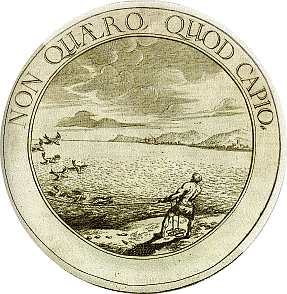TERMINI registers keywords (names and common nouns) representing all branches of early modern knowledge. The first phase (2004-2006) of the project was pursued by the Institute for Historical Studies, University of Mannheim, Prof. Dr. Kai Brodersen, Chair of Ancient History and the Classical Tradition, in close cooperation with CAMENA. Its second phase was part of the CERA-TERMINI Project (2006-2008) run by the German Department of Heidelberg University, Lehrstuhl Prof. Kühlmann.
TERMINI has expanded the THESAURUS ERUDITIONIS adding comprehensive works on geography, botany, zoology, the mathematical disciplines, medicine and law as well as two multi-volume Latin dictionaries: Estienne/ Gesner: Thesaurus linguae et eruditionis Romanae (1749) and DuCange: Glossarium ad scriptores mediae et infimae Latinitatis (1710).
From selected resources of the THESAURUS ERUDITIONIS we collected keywords that represent objects of knowledge. In the case of dictionaries such as Hofmann: Lexicon universale (1698) we extracted lemmata and definitions. Hofmann numbers 106.000 entries, most of them treating proper names. Estienne/ Gesner comprises 60.000 lemmata, proper names being the smaller number. Systematic works may be screened using their summaries and indices or applying regular expressions for data extraction. The semantic markup CAMENA added to texts of its POEMATA collection is another source of proper names.
All keywords are linked to the pertinent image page of the edition they are culled from. We systematically register inflection types and variant spellings as well as context data such as: alternative designation, broader term or class of objects, definition. Thanks to our partners we are able to use external data as well: authority files of personal names (PND) and subject headings (SWD) supplied by Die Deutsche Bibliothek (DDB); the Morpheus tool developed by the Perseus Project for morphological analysis of Latin word forms. The basic data scheme designed in the first phase of the project can be found here.
Since 2007, these data are being stored in the database Lemmata. The database registers keywords (common and proper nouns) representing all branches of early modern knowledge. Collecting matching items from selected resources of the THESAURUS ERUDITIONIS is the first step. We register variant spellings and inflection types as well as context data such as: alternative designations, definitions, cross references etc. All data sets are linked to the edition they are culled from (image pages, machine readable texts). From 2008 to 2011 work continues (see EVRECA) within the frame of the eAQUA enterprise funded by the Bundesministerium für Bildung und Forschung (BMBF).
Last modified January 12, 2012

